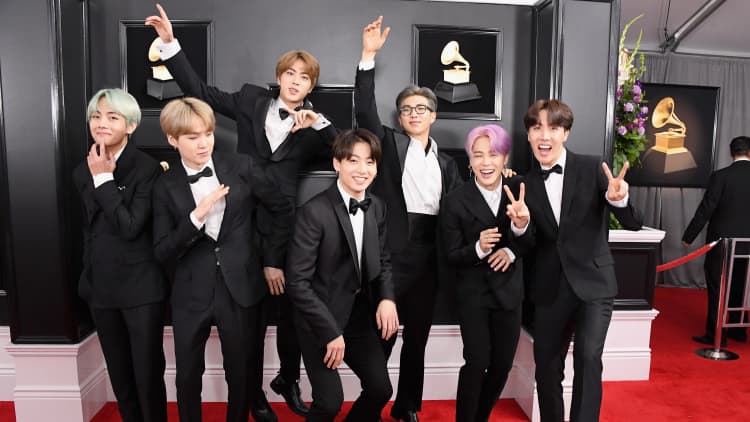BTS is taking the American music scene by storm.
The seven-member boy band from South Korea has had three No. 1 albums on the Billboard chart. The music video for their single, "Boy with Luv," broke YouTube's record for the most views in 24 hours. And the group just wrapped up a six-stop U.S. stadium tour that raked in $44 million and attracted nearly 300,000 fans, according to Billboard.
BTS's success in the U.S. has prompted comparisons to classic American boy bands like the Backstreet Boys and NSYNC, along with other international sensations like The Beatles and One Direction. But the group's accomplishments are just one piece of the steady rise of K-pop, a genre that has been producing hit-making acts dating back to the 1990s.
The first K-pop group, Seo Taiji and Boys, debuted in 1992 with the song "I Know," which incorporated Western sounds like hip-hop and R&B. Although the song was a far cry from traditional South Korean music, Seo Taiji and Boys became wildly popular and changed the country's music scene forever. But most Americans' introduction to K-pop wasn't until 20 years later, when "Gangnam Style" by Psy was released in 2012. The viral hit peaked at No. 2 on the Billboard chart, an impressive feat for a song in a language other than English.
When BTS came on the scene in 2013, they offered a different image of K-pop than Psy's meme-worthy dance moves. The group brought genre-blending songs, powerful choreographies and polished images developed through South Korea's intense training system for aspiring stars. BTS also uploaded a steady stream of content on social media, fostering a passionate fanbase thousands of miles away from Seoul.
But it wasn't just synchronized dances and social medial savvy that propelled BTS to their status as the reigning boy band in America. Their lyrics — many of them written by the members themselves — touched on universal themes like mental health, self-love and the pressure to succeed. They resonated with fans, despite the language barrier. In 2017, BTS even teamed up with UNICEF to launch the "Love Myself" campaign to raise awareness about violence against children and teens.
BTS's meteoric rise hasn't come without sacrifice. The group took to Twitter last week not to announce a new album or tour, but an "extended period of rest and relaxation." The members hope to "recharge and prepare to present themselves anew as musicians" and "enjoy the ordinary lives of young people in their 20s," they said in a statement.
Still, the rise of K-pop shows no signs of stopping. This year, MTV's signature Video Music Awards will include a "Best K-pop" category for the first time, with BTS as one of the nominees. Several other K-pop groups have signed deals with major American record labels like Interscope and Capitol Records, a sign that industry leaders are waking up to the potential of the genre.
"We've never really seen a phenomenon like BTS," Jason Lipshutz, senior direct of music at Billboard, told CNBC Make It. "It's really a sight to behold."
Don't miss: Rihanna is America's richest female musician—here's why money 'is not going to stop me from working'
Like this story? Subscribe to CNBC Make It on YouTube!




